GBH Read online
Page 8
“She’ll never get the mums and dads to vote for her if she comes on looking like that tomorrow night,” Howard says. “In that coat she should be on a lead. That’s the trouble today; no style. Where are the Garlands, the Dietrichs, I ask myself.”
“Have you heard her?”
“No. But I can imagine.”
“All right, fellers,” says Eddie. “ ‘She’s Leaving Home.’ A one, a two. And.”
The group begins the backing. The girl takes the mike from its stand. Then she begins the number.
When she’s finished, the following silence isn’t just because she’s stopped singing. Howard says, “I don’t believe that.”
I don’t say anything.
“That,” Howard says. “That, what I’ve just heard.”
I take a sip of my drink.
“She’s very good,” I say.
“Good?” Howard says. “The last time I heard anything like that, well, I can’t remember the last time. Like one or two other aspects of my leisure activities.”
“She can certainly sing,” I say.
“That’s not singing, mate,” says Howard. “You don’t just call that singing.”
Meanwhile the girl has asked Eddie if that was all right. Eddie says, offhand, “Yeah, fine. Want to do the other, the encores?”
“If you like.”
She does “If You Could See Me Now,” at a quarter its usual pace. Very effective. Then she does “The More I See You,” with the standard Chris Montez backing.
“Amazing,” Howard says, dreamlike.
The girl says, “That’s that, then.”
“Yeah,” Eddie says. “Great.”
“I’ll see you tomorrow, then.”
“You not sticking around for a drink after?”
“No, I’ve got to be going.”
She picks her glass up off one of the amplifiers, takes a sip.
“It’s Friday night. We’ll be going to the South for a bevy.”
“Wonderful.”
She finishes her drink, gives her glass to Eddie.
“I’ll see you tomorrow. Seven?”
“Yeah, kicking off seven-thirty. Can’t keep the geriatrics out too late in the cold night air. Can’t afford to lose any of our public.”
“See you then, then.”
She walks to the side of the stage, goes down the steps and out of the side exit.
Eddie puts her empty glass back on the amplifier.
“Right,” he says to the group. “Let’s give ‘Viva España’ a run-through.”
THE SMOKE
“BAD NEWS ABOUT RAY Warren,” Mickey said. “Or for him. Or for us, temporarily.”
“What’s that, Mickey?” I asked him.
“His old lady. He phoned last night. She snuffed it. He’s staying up there for a few days, until after they’ve put her in the ground.”
“Sorry to hear it,” I said.
“Yeah, I knew you would be,” Mickey said. “You want me to organise a wreath?”
“Yes, I should do that.”
“Shall I get two made up while I’m at it?” he said.
“Let’s leave that open till he gets back,” I said to him. “We can check on him after we’ve talked to Hales.”
“When do you want to do that?”
“As soon as possible.”
“He’s picking up in Birmingham at the moment. He’ll be back in the morning.”
“Tomorrow night, then.”
“Yeah,” Mickey said. “About that.”
“What about it?”
“Sammy. He’s in a constant state of macaroni at the moment.”
“So what’s new about that?”
“Nothing. But, you know. Maybe we ought to use another place.”
The patina of what James had said the other day drifted into my mind.
“He doesn’t know what’s gone down,” I said. “Not what’s really gone down.”
“Oh, no. He knows nothing. But—”
“Perhaps you’re right Sammy’s the instinctive type. Yes. All right. Any ideas?”
“Well,” Mickey said. “There’s always my drum.”
Mickey had two places that I knew of. One was a flat in Covent Garden. The other was a house in Notting Hill.
“Which one?”
“The flat.”
“Why?”
“Safe as houses, if you’ll pardon me. I mean, top floor; nothing below me but offices. Everybody’s gone home by six o’clock. Anything untoward happens, like with Mal, just down the stairs and out the back with him.”
“I thought you’d just re-carpeted throughout.”
“Can always put polythene down, can’t we?”
Again James’s words hung in my mind. I shook my head.
“Farlow,” I said. “He’s creaming himself at the thought of evening up after the last lot.”
“Farlow?” Mickey said. “What does he know?”
“He knows where your flat is.”
“So?”
“At the moment he’ll have got eyes out all over the place.”
“Again, so?”
“If anything goes wrong, he could pick it up.”
“Look,” Mickey said, “he’s not going to be watching the place himself, is he?”
“No.”
“So it’ll be a minion, right?”
“Right.”
“So the minion would be in full possession of the facts, wouldn’t he? What he’d seen.”
“Yes.”
“Well, supposing Farlow wanted to use the facts to squeeze us on behalf of the Shepherdsons. He couldn’t just tell his minion to tear a page out of his notebook, could he? Not if it was like with Mal. The minion might rush straight upstairs. Farlow wouldn’t chance it.”
“Perhaps.”
“I mean, it’s not like with Sammy. The trouble with him not knowing the full score, we don’t know whose office he might stumble into. In this case it’s safe because Farlow wouldn’t risk the same kind of facts being carried into the same kind of office, because if he was squeezing for the Sheps and we went down he knows Morville’d make sure Farlow and the Sheps played the ukelele when the ship went down.”
“Perhaps. But I understand the brothers are unhappy with the way he fucked up the last stroke.”
“Same difference. Without them giving him full support, he’s not exactly going to be motivated to try and get the Commissioner’s job, is he? If that was the case, he could have tried to hang one on us a dozen times over, before he decided on going for the kind of promotion the Sheps dish out.”
I lit a cigarette.
“Yes,” I said. “I take all those points, Mickey.”
“So,” he said. “My place then.”
I blew smoke across the top of my desk.
“Find another place, Mickey.”
There was a silence, very short.
“Yeah, well, all right,” Mickey said, standing up. “I’ll find another place, then.”
“Thanks, Mickey,” I told him. “And for tomorrow night, eh?”
After he’d gone, his eagerness to use his flat remained behind, mingling in my mind with the words James had spoken a day or so before.
THE SEA
BETWEEN THE TREES, THE path that leads to the bungalow is just wide enough to accommodate the width of the Marina; untrimmed branches scratch at the bodywork like the fingers of harpies against a passing tumbril.
Then the branches are gone and the headlights illuminate the almost blank brickwork that forms the side of the bungalow facing the access from the copse. In this wall, there is one small window, high up, and the garage door, only the top of it at present visible above the rim of the short slope that has been cut to drop below the normal level of the ground. The only other feature is the flashing glass of the front door as the headlights sweep across it.
The Marina dips down the short slope and passes through the photo-electric eye and the garage door rolls up, then down again, behind me.
&nbs
p; I don’t switch off the headlights until I’ve switched on the garage’s main light. When I’ve done both these things, I take the flask from my pocket and have a long drink. It’s not just the coldness of the concrete that makes me drink now, before going through the door that gives access into the house; it’s because this moment, this switching off of the car, this cold immobility, this homecoming, this is the worst moment of all. The deadness, the quietness, the still starkness of the light, the termination of the movements of the day. And beneath my feet, below the trapdoor on which I stand, the other deadness, the other quietness, that can be revived by the threading of a sprocket and the revolving of a spool and the unfolding of a strip of celluloid.
Jean’s down there, rolled up in a film can, waiting to be revived.
I take another drink and then I walk over to the door that leads into the house. The switch for the photo-electric eye is on the wall by the door, beneath the switch for the garage and the switch that turns on a light on the other side of the door. I unlock the door and operate all three switches and step through the door and lock it behind me.
In the main room, I operate the switch that curtains the picture window. Then I climb the steps to the upper level and switch on the TV for News at Ten. Then I go over to the drinks and pour myself a large one but I don’t immediately sit down. Somehow, the finality of sitting down always seems to act as a breach in my defences against the night thoughts that are waiting to flood into the front of my mind.
I go over to the window and part the curtains slightly. Apart from the narrow strip of light thrown out by the gap I’ve made, everything is a void. Only where the stars stop at the horizon is the blackness complete. I close the curtains and go and refill my glass and drain it and fill it again.
So easy. It would be so easy.
So easy to go downstairs, to get a couple of films, the private ones, run them, face the reminders of Jean, try and exorcise her memory. But after the last one, the last one … there would be no exorcism after that. At least that one wasn’t there, to tempt me with.
Another drink. Another drink and watch the news. Leave the ghosts. Leave them in the basement. Leave them in their winding sheets, in their circular coffins.
Another drink. Stop them advancing, up through the trapdoor, across the garage floor.
THE SMOKE
“MICKEY,” I SAID. “ABOUT tonight.”
“Yes, Mr. Fowler.”
“After you’ve brought Hales along, you don’t have to stay.”
“Mr. Fowler?”
“I don’t think we’ll need you. At the place.”
“How do you mean?”
“I’d like you to wait for us outside. In the car. After he’s been settled down. Just in case.”
“In case of another Mal?”
“Yes.”
“I see.”
“I don’t think so.”
Mickey didn’t say anything.
“There’s no need to sulk. We just won’t be needing you. You know Hales, if he has anything to say, he won’t be long in saying it.”
“I know that,” Mickey said.
I smiled, and poured him some champagne.
“I know it’s one of the perks of the job, as far as you’re concerned,” I said. “But there’ll be other times.”
“Of course.”
“Come on, Mickey.”
He doesn’t say anything.
“It’s not because of Mal, if that’s what you’re thinking.”
“I’m not.”
I drank some of my champagne.
“Will Mrs. Fowler be there?”
“Yes.”
Mickey didn’t say anything.
“Look, I know you don’t like women, Mickey, but—”
“Don’t include Mrs. Fowler in that. It’s different with her.”
“—I know you don’t like women, but these days, women’s lib and all that …”
More silence from Mickey.
“And Mrs. Fowler’s shy about some things. You understand.”
“I understand.”
He drank some of his champagne.
“By the way,” I said. “The place. It’s very good.”
“It wasn’t difficult to fix up.”
“No, it wouldn’t be,” I said. “Not for you.”
After Mickey had left, Jean came into the lounge.
“How did he take it?” she asked me.
“How I expected him to take it,” I said.
She poured herself a drink.
After a while I said, “You’re certain about tonight?”
“Yes, I’m certain,” she said.
“I mean. Watching it’s one thing.”
“I know that.”
“You want to go ahead, then?”
“You know what I want.”
“Yes,” I said. “I know what you want.”
THE SEA
ANOTHER DRINK.
Turn down the TV, turn up the stereo. Loud. New World Symphony. Chords deep and warm. Warmth, to fill the bungalow. That’s what it needs, to counteract the chill of memory. Turn it up louder. I walk over to the stereo. Louder. Another drink. The booze and the noise. Keep the Eumenides where they belong, rolled up, cold in their cans. Canned Eumenides. I smile to myself. Just open the cans and reheat.
I sit on the top of the steps, drinking, cloaking myself in the sound, rocking backward and forward like somebody who’s been punched in the gut.
Then the music stops. The room is full of silence. Just the clicking and the whirring of the stereo machine as it dies.
And then I’m aware of another sound, a light tapping. A light tapping, but not in the room; it’s outside.
Outside, at the window.
I stand up and go over to the piano. I put down my drink on the closed lid and pick up the gun.
If they were ever to come, they wouldn’t do it this way; if they were ever to come. I’d be dead before I passed through the photo-electric cell.
The tapping stops for a moment. Then it starts again.
I walk down the steps into the lower level of the room, below the level of the window. I wait next to the door, by the switches.
Again the tapping stops, and again it starts again.
From where I’m standing below them, I press the switch that operates the curtains. I’ll be able to see them, but they won’t be able to see. Not soon enough, anyway. And then there was the plate glass. By the time they’ve blasted through that, I can take anybody out who happens to be out there. I shake my head. Whoever they were, they weren’t professionals. And not even the local fourth division would tap tap tap as an overture to taking me out. So I press the switch that operates the curtains and the switch that operates the outside light.
The curtains slide apart and the lights illuminate the figure of Lesley, in her Afghan coat and her dark glasses, the light again, like the spotlight in the Dunes, blanking the relief of her features. And the soft inside light combines with the harshness of that outside to diffuse and at the same time double her image in the double glazing of the glass between the two sources of illumination. And my present alcoholic vision doesn’t help in clarifying her appearance.
Thoughts of why she’s here, what she’s doing, seem frozen by the surprise at being presented with her vision.
She stands there motionless, looking into the apparent emptiness of the room for any signs of life.
I press another switch, and, just for the moment, I don’t move. Just in case.
A section of the window slides open, letting in the cold night air. For a moment, she just stands there; then she steps forward, into the room.
I press the switches again. The window closes, and so do the curtains.
She stands still, a foot in front of the curtains.
“Do I have to say, coming, ready or not?” she says.
I slip the gun into my jacket pocket, then step away from the wall. She looks down into the well at me.
“So,” she says. “You
saw the Bond movie, too.”
I still don’t say anything.
“I’m not standing on a hidden trapdoor or anything like that, am I?” she says. “Or is it the crocodile’s night off?”
I move forward to the foot of the steps. She still doesn’t move.
“What are you doing?” I say to her.
“Waiting,” she says.
“Waiting?”
“To be offered a drink.”
“Here,” I say to her. “What are you doing here?”
She shrugs.
“I don’t know really. I was walking on the beach.”
I look at her, not saying anything.
“I often walk on the beach when I can’t rest. Mablethorpe’s only a mile from here if you walk along the beach.”
“But what are you doing here?”
“I saw your light. I was going to turn round and walk back, but I saw your light.”
“How did you know it was mine?”
“Yours is the only house here.”
“You knew where I lived?”
“Of course,” she says. “Eddie told me.”
“Why should he tell you that?”
She looks at me. I begin to mount the stairs.
“You’re pretty drunk, aren’t you?” she says.
I reach the top of the steps and pick up my drink off the top of the piano.
“Why did Eddie tell you where I lived?”
“No reason. Except to impress me, I suppose; I can’t think why.”
I take a sip of my drink and look at her.
“He’s impressed by you,” she says. “So I suppose he thought I would be.”
“But you’re not.”
She shrugs.
“Then why come?”
“I told you; I saw your light. I thought I might be offered a drink. I mean, as you tried to pick me up. As it happens …”
She walks over to the window, then stops, turns to face me.
“Or do I get to go out through the front door this time?”
“The drinks are over there,” I tell her.
She looks at the shelving, then crosses the floor between me and the silent flickering of the TV set and begins to make herself a drink.
“Don’t you have any lemon?” she says.
I don’t say anything.

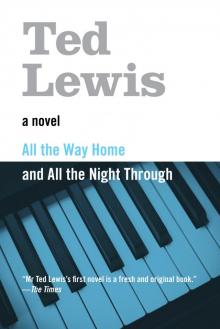 All the Way Home and All the Night Through
All the Way Home and All the Night Through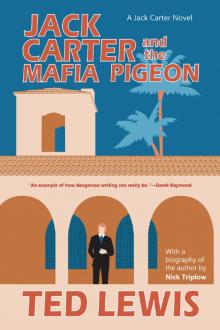 Jack Carter and the Mafia Pigeon
Jack Carter and the Mafia Pigeon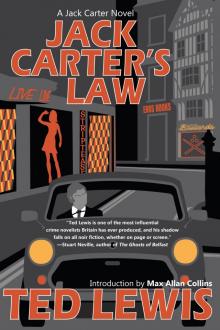 Jack Carter's Law
Jack Carter's Law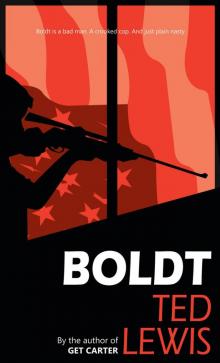 Boldt
Boldt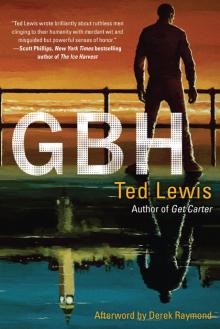 GBH
GBH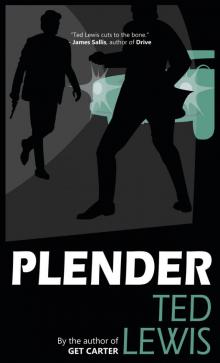 Plender
Plender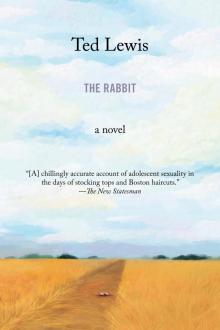 The Rabbit
The Rabbit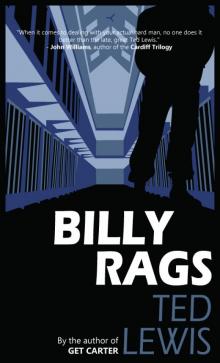 Billy Rags
Billy Rags